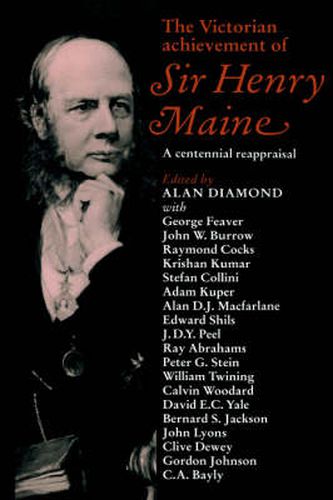Readings Newsletter
Become a Readings Member to make your shopping experience even easier.
Sign in or sign up for free!
You’re not far away from qualifying for FREE standard shipping within Australia
You’ve qualified for FREE standard shipping within Australia
The cart is loading…






In The Victorian Achievement of Sir Henry Maine some of the world’s leading scholars, in a wide range of disciplines, come together to consider the extraordinary achievement of Sir Henry Maine, sometime Master of Trinity Hall, Cambridge (1877-1888) and one of the most powerful and original minds of the Victorian age. The disciplinary range and scholarly stature of the contributors is itself testimony to the fascination of Maine’s work which, after a period of relative neglect, is now recognised as a unique and fecund contribution to the development of social scientific study. The book is divided into four sections, dealing with the principal strands of Maine’s life and writing, viz. his views on social and political progress, his anthropological and social scientific works, his legal and jurisprudential thought, and finally his writings on Indian affairs, the product (in part) of his experiences as the legal member of Council of the Governor-General from 1862 to 1869. The whole amounts to a major reconsideration of a particularly eminent Victorian, and one of the greatest Masters of Trinity Hall.
$9.00 standard shipping within Australia
FREE standard shipping within Australia for orders over $100.00
Express & International shipping calculated at checkout
In The Victorian Achievement of Sir Henry Maine some of the world’s leading scholars, in a wide range of disciplines, come together to consider the extraordinary achievement of Sir Henry Maine, sometime Master of Trinity Hall, Cambridge (1877-1888) and one of the most powerful and original minds of the Victorian age. The disciplinary range and scholarly stature of the contributors is itself testimony to the fascination of Maine’s work which, after a period of relative neglect, is now recognised as a unique and fecund contribution to the development of social scientific study. The book is divided into four sections, dealing with the principal strands of Maine’s life and writing, viz. his views on social and political progress, his anthropological and social scientific works, his legal and jurisprudential thought, and finally his writings on Indian affairs, the product (in part) of his experiences as the legal member of Council of the Governor-General from 1862 to 1869. The whole amounts to a major reconsideration of a particularly eminent Victorian, and one of the greatest Masters of Trinity Hall.